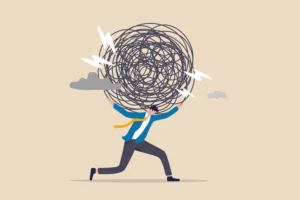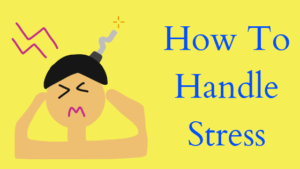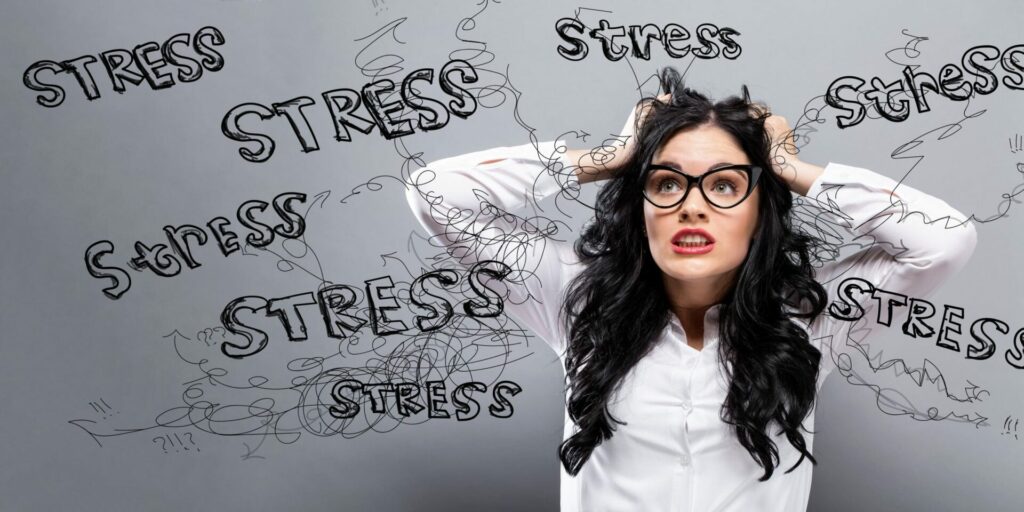Do you feel like you’re addicted to stress? If you’re like most people, the answer is probably yes. It seems like pressure and stress are a normal part of life these days. We’re constantly being told to do more, be more, and achieve more. As a result, many of us feel overwhelmed and stressed out all the time. In this blog post, we will explore the reality of living in a pressure-filled world and discuss some ways to reduce stress levels.
Contents
What Is Stress?
 Stress is a word we hear a lot these days, but what exactly is it? Stress is our body’s response to any demand placed on it. When we perceive a threat, our bodies go into “fight-or-flight” mode. This means that our hearts start pumping faster, our breathing quickens, and our muscles tense up. These physical changes help us to either confront the threat or flee from it.
Stress is a word we hear a lot these days, but what exactly is it? Stress is our body’s response to any demand placed on it. When we perceive a threat, our bodies go into “fight-or-flight” mode. This means that our hearts start pumping faster, our breathing quickens, and our muscles tense up. These physical changes help us to either confront the threat or flee from it.
In the short term, stress can be beneficial. It can help us to deal with difficult situations and also perform at our best. However, when we’re constantly under pressure, it can have a negative impact on our health. It is crucial to find a balance as well as to learn how to manage stress in a healthy way.
There are many different types of stress. Here are some examples:
- Acute stress: This is the kind of stress we feel in response to a sudden, unexpected event. It is our body’s normal “fight-or-flight” response.
- Chronic stress: This is the kind of stress that we feel when we are constantly under pressure. It can be caused by work, family, or other personal problems.
- Positive stress: This is the kind of stress that motivates us to accomplish our goals. It can help us to perform at our best and achieve our full potential.
- Negative stress: This is the kind of stress that can have a negative impact on our health. It can make us feel anxious, depressed, and overwhelmed.
All these distinct yet related types of stress share one commonality: they all originate from our perceptions. In other words, it is our interpretation of a situation that determines whether we perceive it as stressful or not.
Is Addiction To Stress A Real Thing?
 You may be aware of quotes like “I’m addicted to stress” or “stress is my drug of choice.” While these phrases may be used lightly, there is some truth to them. In fact, some experts believe that addiction to stress is a real thing.
You may be aware of quotes like “I’m addicted to stress” or “stress is my drug of choice.” While these phrases may be used lightly, there is some truth to them. In fact, some experts believe that addiction to stress is a real thing.
A study conducted by UCLA found that people who self-identified as “addicted to stress” had higher levels of the stress hormone cortisol. They also had a harder time recovering from stressful situations. This suggests that addiction to stress is a real phenomenon with tangible effects on our bodies.
In recent times, there has been a lot of discussion about whether people can be addicted to stress. While there is no definitive answer, it’s important to understand that stress is a normal response to the demands of life. We all experience it from time to time.
However, some people seem to thrive on stress. They feel a sense of exhilaration and excitement when they’re under pressure. They may even feel like they’re performing at their best when they’re under stress. For these people, stress can become an addiction.
While it’s not an official diagnosis, some experts believe that “stress addiction” is a real phenomenon. It has received a lot of attention in recent years, particularly in the media.
If you think you might be addicted to stress, it’s important to seek help from a qualified professional. They can assess your symptoms and provide you with the support you need.
What Are The Signs One May Be Addicted To Stress?
Stress manifests itself in different ways, both physically and mentally. Here are some common signs that you may be addicted to stress:
- You’re always on the go: You never seem to have a moment to rest or relax. You’re always on the go, and you thrive on being busy.
- You’re a perfectionist: You have high standards for yourself and you’re constantly striving to meet them. You feel like you can never do enough.
- You have a tendency to procrastinate: You often leave things until the last minute, which adds to your stress levels.
- You’re always in “fight or flight” mode: You’re always on high alert, and you find it difficult to relax.
- You’re a control freak: You like to be in control of everything and you find it hard to let go. You often feel anxious and stressed when things are out of your control.
- You’re always stressed: You seem to be in a constant state of stress. You’re always on edge and you find it hard to relax.
- You’re a people pleaser: You feel the need to please others and you often put their needs above your own.
While these are just some of the signs that you may be addicted to stress, it’s important to remember that everyone experiences stress differently. If you’re concerned that you may be addicted to stress, it’s important to seek help from a qualified professional.
What Causes One To Be Addicted to Stress?
 It is no secret that the world we live in today is a pressure-filled one. We are constantly bombarded with demands from work, family, and society. It can be difficult to find time to relax and unwind. For some people, stress becomes a way of life. They thrive on being busy and they feel like they’re always on the go. They may even feel like they’re not performing at their best unless they’re under pressure.
It is no secret that the world we live in today is a pressure-filled one. We are constantly bombarded with demands from work, family, and society. It can be difficult to find time to relax and unwind. For some people, stress becomes a way of life. They thrive on being busy and they feel like they’re always on the go. They may even feel like they’re not performing at their best unless they’re under pressure.
So what causes some people to become addicted to stress? There are a number of different factors that can contribute, including:
- A need for control: Some people feel the need to be in control of everything in their lives. They find it difficult to let go and they often feel anxious and stressed when things are out of their control.
- A need for approval: Some people feel the need to please others and they often put their needs above their own. This can lead to a lot of stress.
- A fear of failure: Some people have a fear of failing, which can lead them to put pressure on themselves. They may feel like they need to be perfect in everything they do.
- A history of trauma: Some people have experienced traumatic events in their lives, which can lead to a feeling of being constantly on edge.
While there are a number of different factors that can contribute to stress addiction, it’s important to remember that everyone experiences stress differently. If you’re concerned that you may be addicted to stress, it’s important to seek help from a qualified professional.
How Does This Impact Life?
While there is no definitive answer, some experts believe that addiction to stress is a real phenomenon with tangible effects on our bodies. There have been studies conducted that found that people who self-identified as “addicted to stress” had higher levels of the stress hormone cortisol. They also had a harder time recovering from stressful situations.
This suggests that addiction to stress is a real thing with very real consequences. These can manifest in the form of physiological and psychological disorders such as:
- Anxiety disorders
- Depression
- Insomnia
- Type A personality (a personality characterized by high levels of competitiveness, ambition, and a need for control)
- Acute stress disorder
- Obsessive-compulsive disorder
- Chronic pain
- Digestive issues
- Weight gain or weight loss
- Heart disease
- High blood pressure
- Stroke
- Migraines
While addiction to stress is not an official diagnosis, it’s important to be aware of the signs and symptoms. If you think you might be addicted to stress, it’s important to further seek help from a qualified professional.
What Are The Ways To Deal With It?
 Luckily, there are various ways that you can deal with stress addiction. Here are a few options:
Luckily, there are various ways that you can deal with stress addiction. Here are a few options:
- Stress management: This involves identifying the sources of your stress and taking steps to reduce or eliminate them. It may also involve developing healthy coping mechanisms, such as exercise, relaxation techniques, and positive thinking.
- Meditation: Meditation can help you to focus on the present moment and also to let go of thoughts that contribute to stress.
- Yoga: Yoga combines physical activity with meditation and breathing exercises. It can help to improve your overall well-being and reduce stress levels.
- Acupuncture: This traditional Chinese medicine technique involves the insertion of thin needles into the skin. It’s believed to help relieve stress and promote relaxation.
- Massage: Massage can help to relax the body and reduce muscle tension.
- Lifestyle changes: Making healthy lifestyle changes, such as eating a balanced diet, getting adequate sleep, and getting regular exercise, can help to reduce stress levels.
While there is no one-size-fits-all solution, these are just some of the ways that you can deal with stress addiction. If you’re struggling to cope with your stress levels, it’s important to seek help from a qualified professional.
Professionals use therapy, medication, or a combination of these to help people who are addicted to stress.
- Therapy: This is the process of talking to a therapist about the thoughts, feelings, and behaviors that contribute to stress. It can aid in the development of healthy coping mechanisms and help to improve overall well-being. There are various types and approaches to therapy that can be helpful for stress addiction. Some examples include:
-Cognitive-behavioral therapy
-Clinical hypnotherapy
-Expressive art therapy
- Medication: They work by altering the levels of chemicals in the brain that contribute to stress. This can help to improve mood and reduce anxiety. It is also helpful in the treatment of co-occurring disorders, such as depression and anxiety. Some examples of medications that are used to treat stress addiction include:
-Beta-blockers
-Selective serotonin reuptake inhibitors (SSRIs)
-Serotonin-norepinephrine reuptake inhibitors (SNRIs)
-Tricyclic antidepressants
-Monoamine oxidase inhibitors (MAOIs)
It’s important to remember that everyone experiences stress differently and what works for one person may not work for another. It’s important to find what works for you and also to seek help from a qualified professional if you’re struggling to cope with your stress levels.
Conclusion
To conclude, we can state that being addicted to stress is an alarming and real condition that should not be taken lightly. It has many side effects and can be detrimental to one’s health both mentally and physically.
If you think you might be addicted to stress, it’s important to seek help from a qualified professional. They can assess your symptoms and provide you with the support you need. Living with stress addiction can be difficult, but there is help available. If you think you might be struggling with this issue, please reach out for support.
If you or someone you know is looking for psychological help, Therapy Mantra is here for you. We are the leading providers of online therapy and counseling. Our team of highly trained and experienced therapists can provide assistance at the most affordable rates. Contact us today to learn more about our services. You may also visit our website to book an online therapy session or download our free Android or iOS app for more information.


